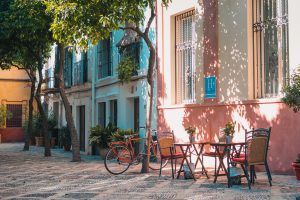In recent decades, Portugal has emerged as one of Europe’s most sought-after destinations for expatriation, especially among digital nomads, remote workers, and retirees from northern countries. In this article, we’ll explore the factors contributing to this surge in people choosing to live in Portugal.
Why Choose Portugal?
Portugal offers a multitude of attractions for those considering a move to this charming European country. From stunning beaches and a pleasant climate to rich gastronomy, breathtaking landscapes, and historical heritage, Portugal has much to offer. However, transitioning from being a visitor to a resident involves considering various aspects beyond the tourist experience, including work opportunities, healthcare, cost of living, safety, and the residency process.
Exploring the Cost of Living
Undoubtedly, one of the primary reasons that make Portugal an attractive destination for relocation is its affordable cost of living. As one of the most budget-friendly countries in Europe and the most economical in Western Europe, Portugal appeals to a diverse range of individuals, particularly those who can work remotely and are not tied to the local job market. This affordability extends to pensioners from stronger economies seeking a place where their retirement income stretches further.
For instance, a studio apartment in Lisbon, the most expensive city in Portugal, costs around 800 Euros per month, with even lower prices in places like Braga, Aveiro, or Coimbra. Idealista.pt is the most widely used platform for rentals.
Taxes are also low, with services typically costing around 50 to 150 Euros per month, and grocery shopping being wallet-friendly. Enjoying a meal in a simple restaurant ranges from 8 to 15 Euros.
Embracing the Climate and Beaches
Among the perks of living in Portugal are its climate and beautiful beaches that stretch along the entire coastline from north to south. In regions like Algarve, located in the southernmost part of Portugal, you’ll find a blend of Portuguese and English being spoken due to the substantial number of British residents. The sunny days and inviting seas make these areas particularly alluring.
Language and Communication
Portuguese people are enthusiastic about speaking foreign languages, particularly English and Spanish. This eagerness to communicate in multiple languages makes it relatively easy to interact with locals. While you’ll need to learn Portuguese to fully integrate, its similarity to Spanish can make the process smoother. However, keep in mind that Portuguese from Portugal may differ significantly from Brazilian Portuguese, which you might have encountered during travels in Brazil.
Safety and Security
Safety is a major highlight of living in Portugal, as it ranks among the safest countries globally. This factor significantly contributes to the sense of ease and comfort that expatriates and newcomers experience in their daily lives.
Navigating the Job Market
Portugal has experienced a significant economic resurgence in recent years, leading to a remarkable drop in unemployment from 17% in 2014 to the current 7%. The growing demand for technology-related roles, offering above-average salaries, mirrors the global trend. It’s important to note that while the cost of living is low, wages in Portugal are also among the lowest in the region. The average salary in Portugal is around 20,000 Euros per year, which is half of what is seen in France. This makes Portugal an attractive option for remote workers, but not as much for those seeking local employment.
Residency in Portugal for EU Citizens
For Spanish citizens and citizens of other EU countries, residing in Portugal for up to 3 months is hassle-free with a valid ID. If you intend to stay longer, you’ll need to apply for the Certificate of Registration for EU Citizens within 30 days of your initial 3-month stay. This process involves a visit to your local City Hall and incurs a fee of 15 Euros.
The same rules apply to citizens of other EU countries, as well as Switzerland, Iceland, Norway, and Liechtenstein.
Residency in Portugal for Non-EU Immigrants
Non-EU citizens can also legally reside in Portugal. For short stays of 90 days or less, you can visit Portugal as a tourist. Depending on your nationality, you might need a Schengen visa. Most citizens of Latin American countries don’t require a Schengen visa, but some exceptions exist, such as Bolivia, Ecuador, and the Dominican Republic.
A recently introduced option is the Temporary Residence Visa, often dubbed the «visa for digital nomads.» This visa allows individuals with remote employment to stay in Portugal for up to a year, provided they meet specific requirements. These requirements include demonstrating a minimum income of 2,800 Euros per month for the last three months, having medical insurance coverage for the initial four months (Worldpackers members receive a discount on Pax Assistance insurance), and proof of online work. Notably, if the remote work is for a company, it cannot be a Portuguese company. Applications are submitted online through vistos.mne.gov.pt.
Once your visa is approved, you can stay in Portugal for up to 120 days, during which time you must register as a resident at the SEF (Servico de Estangeiros e Fronteiras).
This visa also grants you freedom of movement within the Schengen Area, similar to European citizens.
Another alternative is the Job Search Visa (visto de procura de trabalho), allowing you to stay in Portugal for 120 days (extendable for an additional 60 days) while seeking employment.
For detailed information about visas and which one suits your needs, visit the official website of the Ministério dos Negócios Estrangeiros or eportugal.
Embrace the Portuguese Experience as a Volunteer
For those looking to experience life in Portugal on a budget, volunteering offers an excellent opportunity. Volunteering allows you to travel inexpensively while contributing to local projects. In return for a few hours of work each day, you’ll receive accommodation and, in many cases, meals.
Volunteer positions vary widely, from working in some of Porto’s best hostels to contributing to a food truck in the picturesque Azores Islands. Engaging with Portuguese people in this manner not only provides insights into their culture but also offers a chance to learn the language—an essential aspect of adapting to life in Portugal.
Conclusion
Living in Portugal presents a myriad of advantages, from its affordability and pleasant climate to the safety it offers. Whether you’re a digital nomad seeking remote work opportunities, a retiree looking to stretch your pension, or someone intrigued by the country’s rich culture and history, Portugal has something to offer everyone. By understanding the residency process and exploring the various visa options, you can embark on a fulfilling journey of living in this enchanting European destination.



